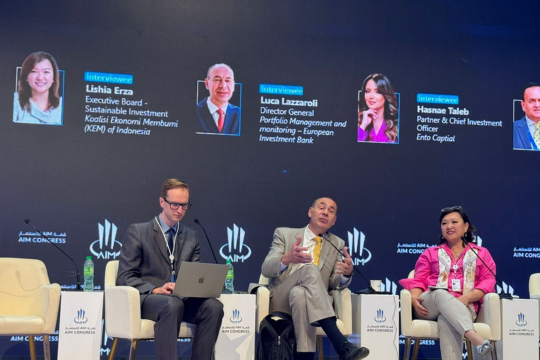Unlocking Downstream Potential Sustainably: Key to Indonesias Economic Growth 2045
Economic Transformation: Building Value from Biological Resources
Indonesia is aiming to boost its economy by increasing investment in downstream industries, not just in mining, but across various sectors. According to the Long-Term National Development Plan (RPJPN) 2025-2045, the environment and forestry sector alone contributed IDR 220 trillion in 2022. By focusing on downstream processing—turning raw materials into high-value products—Indonesia can support its green, blue, and bioeconomy development goals.
Opportunities in Downstreaming:
-
Food Sources: Indonesia is home to 500 types of food resources that could be turned into valuable products like medicines, cosmetics, and new materials.
-
Example: The dracorhodin compound from the Jernang fruit (dragon blood) is used in the pharmaceutical industry for its antimicrobial and antiviral properties. It's valued at about USD 2.9 per milligram, or IDR 100 billion per kilogram.
-
Growing Market: With around 70 million people in the high consumption class, Indonesia has a strong domestic market for high-quality products. Effective downstream processing can cater to this demand and support the local economy.
Regional & Village Development: Strengthening Local Value Chains
Strategic crops like coffee, cocoa, coconut, and spices hold great potential for Indonesia’s economy. By processing these commodities into higher-value products, the country could generate up to USD 82 billion—significantly more than the USD 8.5 billion earned from selling raw commodities.
Strengthening Local Value Chains:
-
Collaborative Business Models: Connecting businesses involved in production, high-value processing, and market access can create a stronger, more integrated value chain.
-
Overcoming Challenges: Aging plants and low productivity are barriers, so replanting and rejuvenating crops are necessary to ensure a steady supply of raw materials.
-
Involving Indigenous Communities: Including indigenous and local communities in sustainable and restorative management practices helps maintain the integrity of the products and the environments they come from.
Case studies:
KULAKU Indonesia: A social enterprise working with over 500 coconut farmers in Banyuasin, South Sumatra, to produce and process coconuts in a sustainable way.
Boosting Entrepreneurship and Job Creation
Focusing on downstream processing of biological resources can energize Indonesia’s impact entrepreneurship scene, which has been growing steadily over the past two decades. By 2020, the country had more than 300,000 entrepreneurs dedicated to solving environmental and social issues through their businesses.
Potential for Growth
-
Key Sectors: Many of these entrepreneurs are involved in agriculture, fisheries, creative industries, and education.
-
Job Creation: The sector has the potential to grow employment by 42% annually, with up to 1.8 million new green jobs expected by 2030.
Whats next?
To fully realize the benefits of economic transformation through the bioeconomy, green economy, and blue economy, Indonesia should focus on these key areas:
-
Ensuring Quality Supply:
-
Provide policy support, funding, and technical assistance to ensure a consistent supply of high-quality commodities, aligning with principles of regenerative agriculture and agroforestry.
-
-
Building a National Farmer Database:
-
Establish a system to track farmers and their production capacity for strategic commodities in the global supply chain.
-
This database should cover all high-value commodities that are critical for downstream processing.
-
By diversifying its downstream sectors, Indonesia can reduce its reliance on extractive sector and mitigate the environmental and social risks associated with it. Sustainable management of biological resources not only boosts economic value but also creates new job opportunities and encourages entrepreneurship.

